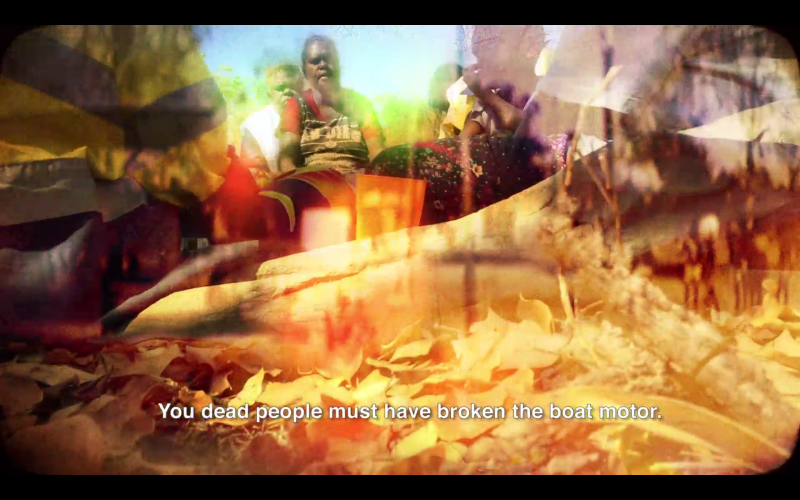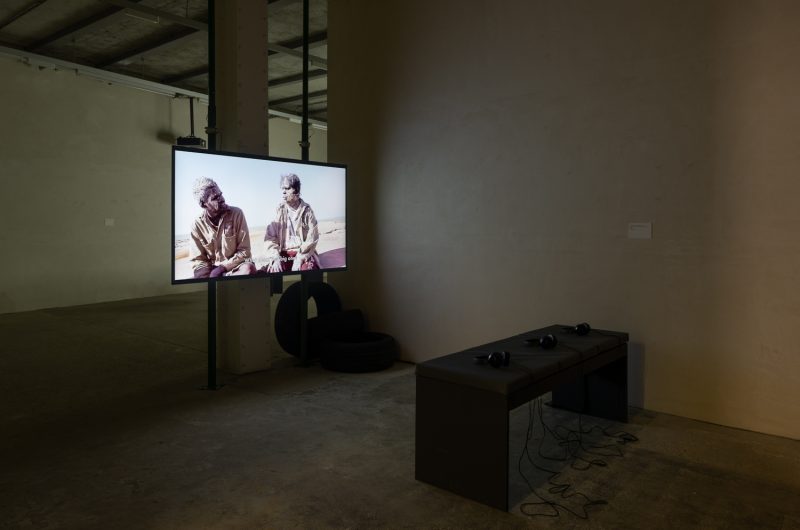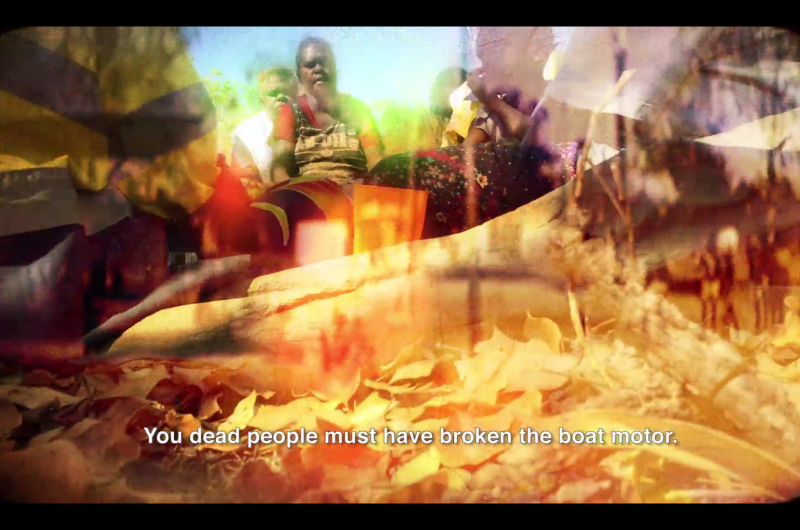TALK: Filipa Ramos on Karrabing Film Collective
Karrabing is an indigenous Emmiyengal word referring to the lowest point of the tide, an occasion for collective gatherings along the northwestern coastline of Australia, home of the Karrabing Film Collective. Karrabing is not a clan, not a language group, not a nation. It is an aspiration for a world in which Indigenous members control their lands, imaginations, pasts and futures. Over the years, and on different occasions ranging from online screenings, to public talks and large exhibition settings, writer and curator Filipa Ramos has been in dialogue with and presenting the work of the Karrabing Film Collective, attending to how their films are based on real-life events in which past, present and future are implicated in one another, and exploring the multiple demands and inescapable vortexes of contemporary indigenous life. Joining their critique of settler colonialism’s ongoing mission of domination and supremacy, she reflects on the significance of their work in its movement between situatedness and global circulation. Filipa Ramos was joined by Dr Ros Gray (Goldsmiths College) as a respondent.
BIOGRAPHIES
Filipa Ramos, PhD, is curator whose research, manifested in exhibitions, texts, lectures and publications, focuses on how culture addresses ecology, attending to how contemporary art fosters relationships between nature and technology. She was Director of Contemporary Art of the City of Porto. In 2022, she curated “Persones Persons”, the 8th Biennale Gherdëina and in 2021 she co-curated “Bodies of Water”, the 13th Shanghai Biennale. She contributed for Documenta 13 (2012) as curator of the Research section and Documenta 14 (2017) as editor of Keimena, Documenta 14’s Film Program. Ramos is curator of Art Basel Film, a founding curator of the online artists’ cinema Vdrome. Ongoing and co-founder of the arts, humanities and science festival The Shape of a Circle in the Mind of a Fish (with Lucia Pietroiusti, since 2018). Ramos was Editor-in-Chief of art-agenda/e-flux (2013-20) and Associate Editor of Manifesta Journal (2009-11) Her upcoming book, The Artist as Ecolo- gist, will be published by Lund Humphries in 2024. She is Lecturer at the Arts Institute of the Fachhochschule Nordwestschweiz, Basel, where she leads the Art and Nature Master seminars and the Bachelor’s special projects.
Ros Gray is Reader in Fine Art, Critical Studies and Programme Director of the MA Art & Ecology at Goldsmiths College. Her research and teaching often involves collaborations with artists, scientists and activists, addressing ecological emergency with an emphasis on climate justice. Coming to ecology from a background researching militant filmmaking, she is interested in decolonial, eco-feminist and queer approaches to ecological stewardship. Ros is on the Editorial Board of Third Text and is co-commissioning editor of the Goldsmiths Press book series Planetarities. She has organised numerous international conferences and film screening programmes, public engagement relating to soil care and climate change, and she was commissioned to make the podcast ‘The Coloniality of Planting’ by Camden Art Centre for the series Botanical Minds. Ros has coordinated the Goldsmiths Allotment since 2016 and she is currently leading the development of the Art Research Garden and Laboratory.
Karrabing is an indigenous Emmiyengal word referring to the lowest point of the tide, an occasion for collective gatherings along the northwestern coastline of Australia, home of the Karrabing Film Collective. Karrabing is not a clan, not a language group, not a nation. It is an aspiration for a world in which Indigenous members control their lands, imaginations, pasts and futures. Over the years, and on different occasions ranging from online screenings, to public talks and large exhibition settings, writer and curator Filipa Ramos has been in dialogue with and presenting the work of the Karrabing Film Collective, attending to how their films are based on real-life events in which past, present and future are implicated in one another, and exploring the multiple demands and inescapable vortexes of contemporary indigenous life. Joining their critique of settler colonialism’s ongoing mission of domination and supremacy, she reflects on the significance of their work in its movement between situatedness and global circulation. Filipa Ramos was joined by Dr Ros Gray (Goldsmiths College) as a respondent.
BIOGRAPHIES
Filipa Ramos, PhD, is curator whose research, manifested in exhibitions, texts, lectures and publications, focuses on how culture addresses ecology, attending to how contemporary art fosters relationships between nature and technology. She was Director of Contemporary Art of the City of Porto. In 2022, she curated “Persones Persons”, the 8th Biennale Gherdëina and in 2021 she co-curated “Bodies of Water”, the 13th Shanghai Biennale. She contributed for Documenta 13 (2012) as curator of the Research section and Documenta 14 (2017) as editor of Keimena, Documenta 14’s Film Program. Ramos is curator of Art Basel Film, a founding curator of the online artists’ cinema Vdrome. Ongoing and co-founder of the arts, humanities and science festival The Shape of a Circle in the Mind of a Fish (with Lucia Pietroiusti, since 2018). Ramos was Editor-in-Chief of art-agenda/e-flux (2013-20) and Associate Editor of Manifesta Journal (2009-11) Her upcoming book, The Artist as Ecolo- gist, will be published by Lund Humphries in 2024. She is Lecturer at the Arts Institute of the Fachhochschule Nordwestschweiz, Basel, where she leads the Art and Nature Master seminars and the Bachelor’s special projects.
Ros Gray is Reader in Fine Art, Critical Studies and Programme Director of the MA Art & Ecology at Goldsmiths College. Her research and teaching often involves collaborations with artists, scientists and activists, addressing ecological emergency with an emphasis on climate justice. Coming to ecology from a background researching militant filmmaking, she is interested in decolonial, eco-feminist and queer approaches to ecological stewardship. Ros is on the Editorial Board of Third Text and is co-commissioning editor of the Goldsmiths Press book series Planetarities. She has organised numerous international conferences and film screening programmes, public engagement relating to soil care and climate change, and she was commissioned to make the podcast ‘The Coloniality of Planting’ by Camden Art Centre for the series Botanical Minds. Ros has coordinated the Goldsmiths Allotment since 2016 and she is currently leading the development of the Art Research Garden and Laboratory.
Read Less...


